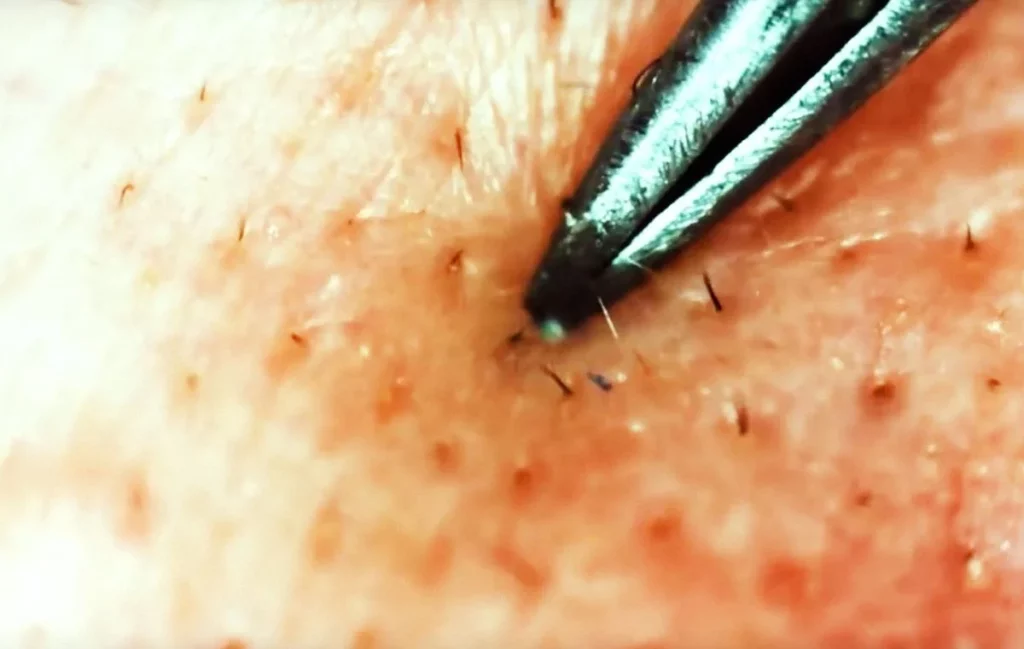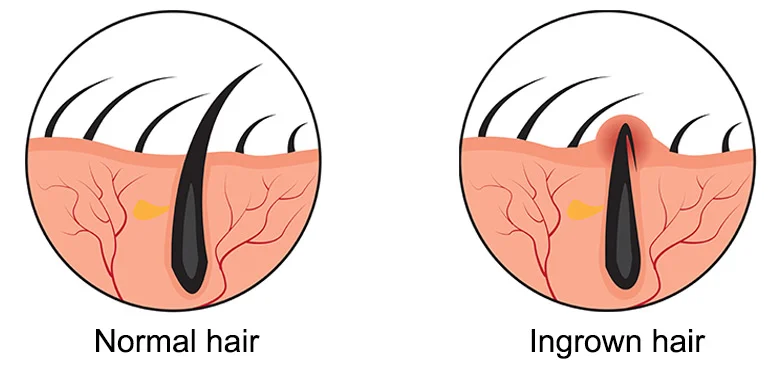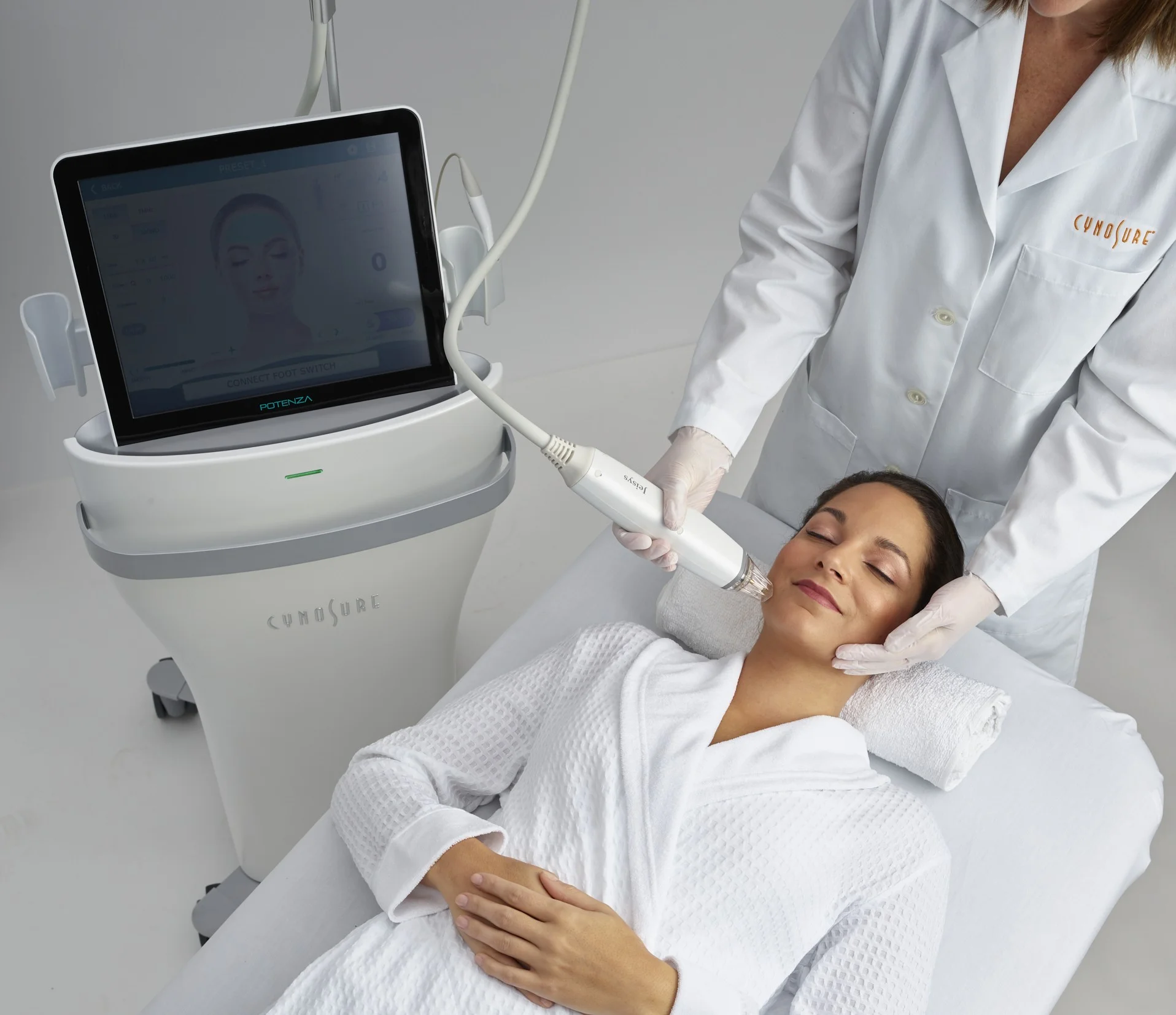“Will laser hair removal treat ingrown hair” has become a common question among individuals seeking relief from the discomfort of ingrown hairs caused by shaving or waxing.
These hairs curl back into the skin instead of growing out, leading to painful inflammation and potential infection.
While addressing this concern, another query often arises: “Does laser cause ingrown hairs?”
Despite these concerns, laser hair removal has proven to be one of the most effective solutions for combating ingrown hairs.
By precisely targeting the hair follicle, laser hair removal destroys it, preventing hair regrowth and eliminating the possibility of ingrown hairs.
In this article, we will delve into the causes of ingrown hairs, the benefits of laser hair removal in preventing them, and additional gender-specific considerations.
Table of Contents
ToggleWhat are Ingrown Hairs
Ingrown hairs happen when hairs grow back into the skin after being shaved or cut.
They’re more common in people with curly or coarse hair.
In women, they’re often found on the legs, pubic area, and armpits, and sometimes on the face in darker skin tones.
Though not serious, they can itch, hurt, or get infected.
Even after they go away, they can leave darker skin and scars behind.
Causes of Ingrown Hairs
When it comes to hair removal, methods like shaving or waxing are common, but they can sometimes trap hair under the skin, resulting in ingrown hairs.
People with curly or coarse hair are more prone to ingrown hairs because their hair tends to curl back into the skin.
Moreover, hormonal issues can contribute to excess hair growth, which often leads to more ingrown hairs.
Additionally, skin conditions that cause rough skin texture can increase the likelihood of ingrown hairs.
When there’s too much dead skin, it can block the hair follicle, causing the hair to grow under the skin or curl back into it.
As a result, the hair grows inward instead of coming out through the skin’s surface.
Related post: Laser Hair Removal for PCOS: Is It Right for You?
Certain medical conditions can heighten the risk of developing ingrown hairs.
Firstly, individuals with acne are more prone to ingrown hairs due to inflammation that disrupts normal hair growth.
Additionally, eczema can contribute to ingrown hairs by causing dry and irritated skin, making it challenging for hairs to grow out properly.
Pili multigemini, a condition where multiple hairs grow from a single follicle, increases the likelihood of hairs curling back into the skin.
These medical conditions can exacerbate the occurrence of ingrown hairs and require specific attention for effective management.
Typically, ingrown hairs manifest as small, red bumps on the skin.
These bumps may be itchy or painful and can develop into whiteheads or pimples over time.
To ensure an accurate diagnosis, it is important to consult a physician to rule out other possible skin conditions.
Can Laser Hair Removal Cause Ingrown Hairs
Contrary to popular misconceptions, laser hair removal does not cause ingrown hairs; in fact, it can help prevent them.
As explained earlier, laser hair removal works by destroying the hair follicles, making it impossible for hair to regrow.
By eliminating the hair follicle, the likelihood of hair becoming ingrown significantly diminishes.
Ingrown Hair Caused by Laser Hair Removal
However, there are a couple of ways laser treatment can indirectly contribute to ingrown hairs.
Firstly, the laser disrupts the follicle, and in some cases, this disruption can cause the hair to grow back in an abnormal way, like inwards.
This is more likely to happen in areas already prone to ingrowns.
Additionally, after treatment, some hairs may regrow finer and weaker.
These weak hairs might not be strong enough to break through the skin’s surface, causing them to grow trapped underneath.
To minimize the risk of ingrown hairs after laser hair removal, there are some things you can do:
- Regular exfoliation helps remove dead skin cells that can trap ingrown hairs.
- Wearing loose clothing is also important, as tight clothing can irritate the skin and make ingrown hairs more likely.
- Keeping the treated area moisturized is another key step to prevent dry, flaky skin that can trap hairs.
- It’s also crucial to follow aftercare instructions from your technician.
How To Treat Ingrown Hair After Laser Hair Removal
- If you notice any redness or swelling caused by ingrown hairs post laser hair removal, applying a cool compress can ease inflammation.
- Also, try avoiding tight clothing, as it can irritate the skin and hinder healing.
- If home remedies don’t work or if the ingrown hairs persist or become infected, it’s important to see your dermatologist. They can offer further advice and treatments tailored to your needs.
Choosing the Right Laser Hair Removal for Your Skin Type and Hair Color
When it comes to laser hair removal, there are different types of lasers available, each with its own strengths and limitations.
The most commonly used lasers include the diode laser, alexandrite laser, and Nd: YAG laser.
The diode laser is versatile and suitable for various skin types and hair colors, making it a good choice for individuals with light skin and dark hair, as well as those with darker skin tones.
The alexandrite laser works best for lighter skin tones and darker hair.
It is a good option for people who want to achieve permanent hair removal in a shorter amount of time.
On the other hand, the Nd: YAG laser is ideal for darker skin tones and finer hair.
It is often recommended for individuals who haven’t achieved satisfactory results with other laser types.
Related post: Laser Hair Removal And Dark Skin: What You Need To Know
To determine which laser is most suitable for your specific skin type and hair color, it is important to consult with a qualified medical professional or laser hair provider.
Our clinic in Limoges, Ontario offers Elite IQ laser – a dual wavelength laser hair removal system that uses both Alexandrite and Nd: YAG lasers to treat a variety of skin types and hair colors.
Book an appointment today or contact us. We’ll assess your unique needs and guide you in choosing the right laser hair removal treatment.
Related post: Cynosure’s Elite iQ: The Life-Changing Laser Hair Treatment
Advantages of Laser Hair Removal for Ingrown Hairs
Laser hair removal is often considered the best method for dealing with ingrown hairs for several reasons. Firstly, it provides a permanent solution.
By destroying the hair follicle, it prevents regrowth, offering a long-lasting fix for ingrown hairs.
Additionally, laser hair removal is relatively painless. While some discomfort may occur during treatment, it’s usually mild and short-lived.
Another benefit is that laser hair removal works for all skin types. It’s safe for both men and women and can be used on sensitive skin without issues.
Overall, these factors make laser hair removal a highly effective and preferred choice for tackling ingrown hairs.
Gender-Specific Considerations for Ingrown Hairs
While ingrown hairs can affect people of all genders, there are specific considerations for men and women. For men, thicker and coarser hair increases the likelihood of hairs curling back into the skin.
Additionally, frequent shaving practices among men further heighten the risk of ingrown hairs.
Common areas for ingrown hairs in men include the neck, chest, and back, with pseudofolliculitis barbae being a chronic skin irritation often affecting black men in the neck and lower face area.
On the other hand, women commonly experience ingrown hairs in the bikini area and on their legs. Women also tend to use waxing for hair removal, which can contribute to the occurrence of ingrown hairs.
These gender-specific factors underscore the importance of tailored approaches to managing and preventing ingrown hairs for individuals of all genders.
Conclusion
Ingrown hairs can be frustrating and embarrassing, but laser hair removal offers an effective solution.
By permanently destroying the hair follicles, laser hair removal prevents the regrowth of hair and minimizes the risk of ingrown hairs.
To prevent ingrown hairs, regular exfoliation, gentle cleansing, moisturizing, and refraining from shaving or waxing in the treated area immediately after laser hair removal are recommended.
Consulting a specialist is essential to determine the suitability of laser hair removal for you.
Book a consultation session with an expert laser treatment provider at our Limoges cosmetic clinic in the United Counties of Prescott and Russell or call if you have any further questions. We’re here to help!
Frequently Asked Questions
Does laser hair removal prevent folliculitis?
Yes, laser hair removal can help to prevent folliculitis. Folliculitis is a skin condition that causes inflammation of the hair follicles.
It can be caused by shaving, waxing, or other methods of hair removal that can irritate the skin.
Laser hair removal destroys the hair follicle, which can help to prevent folliculitis from occurring.
Will laser hair removal stop ingrown hairs?
Yes, laser hair removal can help to stop ingrown hairs. Ingrown hairs are hairs that curl back into the skin instead of growing out.
This can happen when hair is shaved or waxed, or when it is trapped under dead skin cells.
Laser hair removal destroys the hair follicle, which prevents the hair from growing back.
Why do I have ingrown hairs after laser?
There are a few reasons why you might have ingrown hair after laser hair removal.
One possibility is that you are still in the early stages of treatment. It can take several treatments with laser hair removal to achieve permanent hair removal.
During this time, some hairs may still be growing back, which can increase the risk of ingrown hairs.
Another possibility is that you are not exfoliating regularly. Exfoliating helps to remove dead skin cells, which can help to prevent hairs from becoming ingrown.
If you are not exfoliating regularly, you may be more likely to develop ingrown hair after laser hair removal.

Dr. Lian Peter, MD, MPH, CCFP, is a Family physician with a passion for aesthetics. In her aesthetic clinic, she provides a wide range of minimally invasive and non-invasive procedures, constantly honing her skills to deliver exceptional care and help patients attain their desired appearance.








